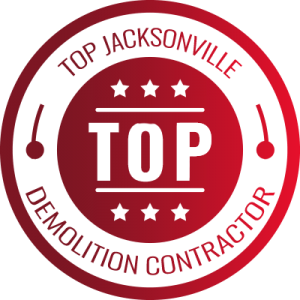



Commercial demolition costs are never the same from one project to the next. For businesses working in places like Kingsland, Brunswick, or Waycross, the cost to remove a building shifts depending on a lot of details. Factors like building size, materials, how crews will access the site, local permits, and cleanup have a direct effect on the bottom line. Commercial demolition in Southeast Georgia comes with its own rules, local codes, and a range of site conditions. These details often set the tone for your entire budget.
Everything from local environmental steps to what roads your trucks can use adds a layer to the process. A downtown lot may need more planning for parking and access, while a rural site could change equipment choices. Each new project means nothing stays generic. To help make sense of what a demolition job might really cost in this region, it makes sense to look at the main factors step by step.
Understanding What Drives Cost on a Demo Site
The first pricing points are straightforward. How big is the structure? A small warehouse or a single-story retail space takes less time and less equipment than a big industrial facility. As square footage increases, so does the amount of debris and the number of loads required to clear the property. Height also shapes the process. Four stories take more to take down safely than single-story shops. If the building is concrete, steel, or a mix of both, bringing it down can take longer and need stronger tools.
Material choices matter, too. If the project is a steel-framed building or one with reinforced concrete walls, more hours, heavier attachments, and bigger hauls are part of the plan. Structures with brick and block or wood frames usually move a bit faster.
Site access changes everything. Sites tucked behind active businesses or fenced with power lines overhead force more hand work and smaller machines. This adds labor and extra time. Wide open sites close to main roads keep costs down because equipment and trucks cycle out faster.
Project deadlines add another piece. A client asking for a full-site demo on a short schedule will likely pay more if crews need overtime or double shifts. Sometimes a project moves in phases based on what the client needs. Phased demo costs more because equipment and labor are spread out over several visits.
With Elev8 Demolition, careful site reviews are part of every initial project walk, so the right equipment and crew are scheduled based on actual site challenges.
Permits, Compliance, and Testing in Southeast Georgia
Getting the legal side right is one of the first steps before a wall comes down. Permits are a must, and every county or city writes its own rules. Some spots might require a fire watch on certain demo days, while other areas want plans to control dust or traffic.
Permit costs include review fees, filing, and sometimes extra steps if the site is near utilities or wetlands. Older buildings add a cost jump because they often need testing for asbestos, lead, or other hazardous materials. This means collecting samples, waiting for lab results, and then planning abatement if a hazard is found.
Below ground, tanks or pipes might need testing too. Some counties keep extra tabs on runoff to protect nearby creeks and marshes, and this could mean installing silt fencing or special debris barriers. In cities with old historic districts, there may be extra paperwork if any part of the building must be documented or saved.
By the end of the compliance process, costs for time and paperwork start to add up. Most demolition estimates include a buffer to help cover permit review, plan updates, or waiting on approvals.
Handling Waste, Materials, and Site Prep
Once demo starts, removing debris is where expenses stack up fast. Concrete, steel, brick, and drywall all need sorting before they leave the property. Heavy items like concrete slabs or deep footers take extra hauls and more loader power. Special jobs, such as roofing materials or insulation with hazardous content, can mean certified disposal and added paperwork.
Waste from commercial demolition in Southeast Georgia is often sent to local transfer stations or certified landfills. Where possible, concrete and steel can be recycled, but even sorting recyclable materials takes time and sometimes rental of extra containers.
Before any machine touches the building, utilities are disconnected. This is more than just flipping a switch—it might mean scheduling with power, water, gas, and even telecom companies. The disconnect timeline is hard to control, especially in busy seasons. HVAC systems, tanks, and specialty piping sometimes need separate shutdowns, draining, or capping. Many of these prep steps are part of the demo company’s checklist and written directly into the project plan.
If hazardous materials turn up in the prep phase, costs rise fast. Local law requires special removal, full records, and sometimes independent inspectors or air-quality monitoring. This is one spot where the rules in Southeast Georgia can really shape a job’s schedule and the final price.
Elev8 Demolition manages removal and disposal at approved local recycling and landfill sites, keeping projects compliant at every stage.
How Payment Usually Works for Commercial Demolition Projects
Few commercial demolition bills are settled all at once. The process is usually broken into a few payments so clients can line these up with their own project schedules. Typically, a portion is due up front to lock in dates and book crews. As work begins, more payments are due based on progress milestones—such as structural removal or site clearing—and the last payment wraps up after passing inspections and the final client walk-through.
A good estimate breaks down what’s covered. Common line items include:
– Site inspection and survey
– Permit processing
– Utility disconnects and safety checks
– Demolition and debris removal
– Hauling fees
– Material recycling or disposal
– Cleanup and basic site grading
Special items like heavy environmental testing or long-term site monitoring may be billed as extras if needed.
Change orders happen when the unexpected shows up—like hidden foundations or unknown tanks. These can delay the timeline and shift billing, but standard contracts spell out how these are tracked and approved.
Some projects might use retainage, holding back a percentage of payment until every punch-list item is done. Others have net terms for payment after invoices, especially for repeat clients or public contracts.
Planning Ahead for the Budget You Need
Commercial demolition in Southeast Georgia takes plenty of local know-how. The blend of urban and small town, lots that border wetlands, and the way county rules shift between zip codes all matter. The more business owners and developers know up front, the less likely they are to face surprise costs.
Good planning—like wiring together site surveys, environmental records, and utility timelines—sets up a demolition plan that sticks to the target budget. Taking time to figure out access, check on city permitting, and pin down waste handling steps up front can keep a project on track and stress down.
A clear, stepwise approach gives commercial property owners a better idea of what to expect, from the first walk to the last haul-out. In Southeast Georgia, a bit of prep early on helps get the numbers right and the process finished on time.
Planning ahead for a commercial demolition in Southeast Georgia starts with the right information and a clear budget. Whether you’re clearing an industrial site or reworking a large retail property, knowing how costs come together makes it easier to move forward. We factor in everything—permits, hauling, shutoffs, and phased timelines—so you’re not left guessing mid-project. When you’re preparing for commercial demolition in Southeast Georgia, Elev8 Demolition can help you take the next step with confidence—just contact us to get started.

